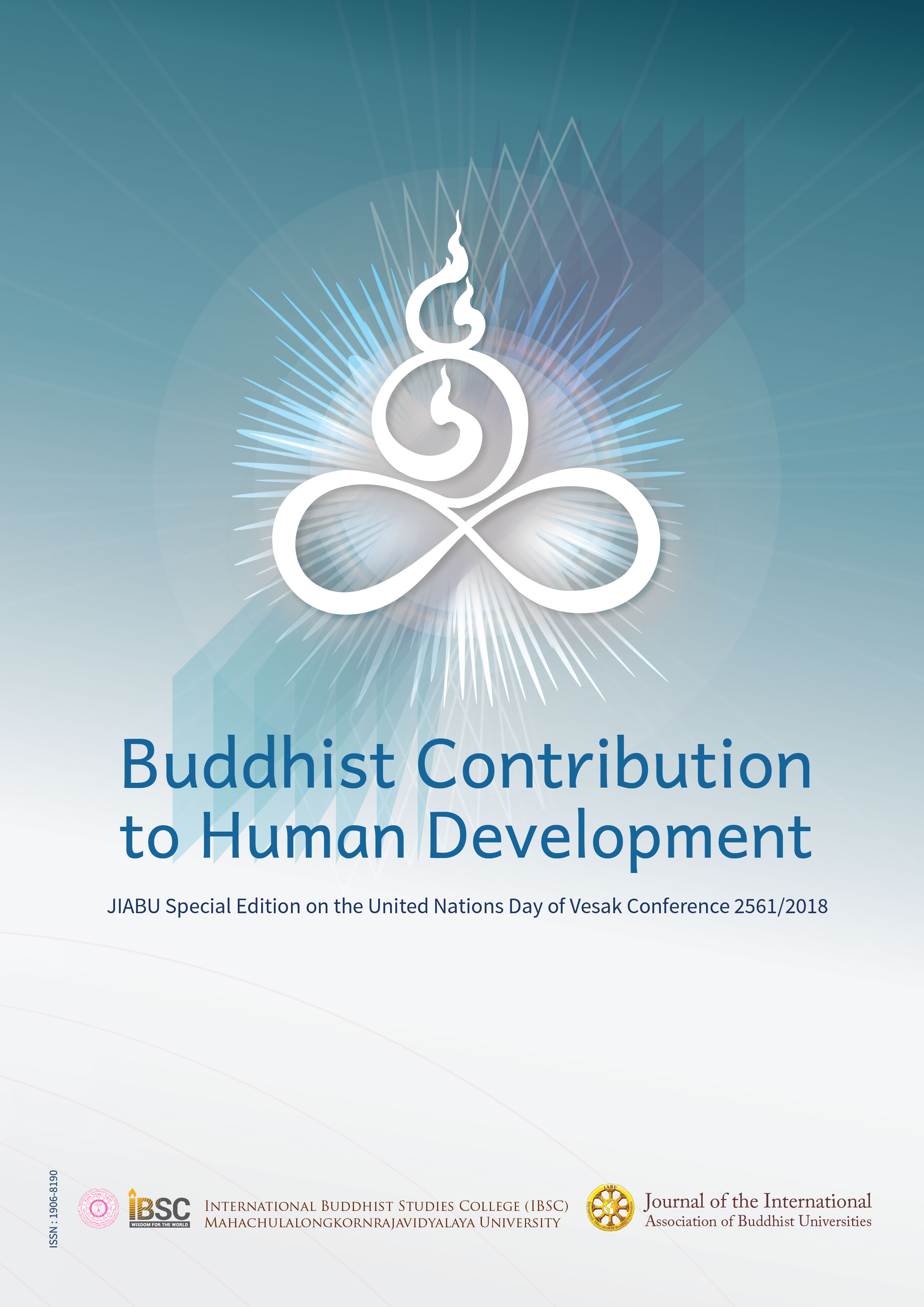Buddhist Values and Actions Towards Peacd and Environment Protection. A Sociological Perspective
Main Article Content
Abstract
Peace and Environmental Protection are two key issues and central avenues of
Buddhist global social and political action contributing to a better future world.
This paper looks into the social values and actions of Buddhist people of some Asian
countries regarding war-peace and environmental protection issues. I try to place the analysis
within the Buddhist cosmovision (meanings and practices) regarding the self (or no-self)
and especially regarding the other beings (interconnection, dependent origination). Buddhist
orientations and practices such as Loving Kindness of the Four Immeasurable are also part
of such cosmovision. I use loving-kindness (love and orientation towards others) as a larger
cultural and social identity frame acting as an umbrella under which views and practices towards
peace and environment emerge.
Article Details
Views and opinions expressed in the articles published by The Journal of the International Association of Buddhist Universities (JIABU), are of responsibility by such authors but not the editors and do not necessarily reflect those of the editors.
References
and Eastern Paths of Liberation” in Scott G. McNall, ed. Theoretical
Perspectives in Sociology. New York: St Martin’s Press.
Borg, I., Groenen, P. (2005). Modern Multidimensional Scaling: theory and applications
(2nd ed.). New York: Springer-Verlag.
Borgatti, S. P., Everett, M. G., & Johnson, J. C. (2013). Analyzing social networks.
SAGE Publications Limited.
Borgatti, S.P., Everett, M.G. and Freeman, L.C. 2002. Ucinet for Windows: Software for
Social Network Analysis. Harvard, MA: Analytic Technologies.
Bhikkhu Bodhi, The Buddha’s Teachings on Social and Communal Harmony: An
Anthology of Discourses from the Pali Canon. Wisdom Publications (2016).
Buddhadasa Bhikkhu, Handbook for Mankind, Mahachula Buddhist University (1980)
Cox, T.F., Cox, M.A.A. (2001). Multidimensional Scaling. Chapman and Hall.
Dhammahaso, Hansa. Wisdom for a Hamonious and Awakening Society. Ayutthaya,
Thailand: MCU, 2014.
Guruge, A., Buddhist Answers to Current Issues: Studies in Socially Engaged Humanistic
Buddhism. AuthorHouse, 2005
Hanh, Thich Nthat, Thich Hhat Hanh’s Sociological Imagination: Essays and
Commentaries on Engaged Buddhism. Human Architecture, 2009
Hastie, Trevor; Tibshirani, Robert; Friedman, Jerome (2009). “14.3.12 Hierarchical
clustering”. The Elements of Statistical Learning (2nd ed.). New York: Springer
Heine, S. & Prebish, C. Buddhism in the Modern World: Adaptations of an Ancient
Tradition. Oxford University Press, 2003.
Inglehart R. y Wayne E. Baker (2000): Modernization, Cultural Change, and the
Persistence of Traditional Values, American Sociological Review, Vol. 65, No. 1,
pg. 23
Inglehart, R., Basáñez, M., Díez-Medrano, J., Halman, L. & Luijkx, R. (2004). Human
beliefs and values. A cross-cultural sourcebook based on the 1999-2002 values
surveys. México: Siglo XXI Editores.
Kaufman, L.; Rousseeuw, P.J. (1990). Finding Groups in Data: An Introduction to
Cluster Analysis (1 ed.). New York: John Wiley.
Kruskal, J. B., and Wish, M. (1978), Multidimensional Scaling, Sage University Paper
series on Quantitative Application in the Social Sciences. Beverly Hills and
London: Sage Publications.
Loyd D., The Great Awakening: A Buddhist Social Theory. NY. Wisdom Publications,
1997
Mohr, John, and Vincent Duqenne. 1997. “The Duality of Culture and Practice” Theory
and Society 26:305-356.
Payutto, Phra. Buddhadhamma (Suny Series, Buddhist Studies). SUNY Press, 1995.
Pew Research Center, The Global Religious Landscape. December 2012: https://
www.pewforum.org/2012/12/18/global-religious-landscape-exec/
Puntarigvivat, Tavivat. Thai Buddhist Social Theory. World Buddhist University (2013)
Rodríguez, J.A. , “Being Buddhist in New Lands: Mapping Buddhist Social-Cultural
Identities” in IABU, Teaching Dhamma in New Lands: Academic Papers
presented at the 2nd IABU, Ayutthaya, Thailand (Bangkok, Thailand:
Mahachulalongkornrajavidyalaya University, 2012).
Rodríguez Díaz. José A. “ Being Buddhist in the XXI Century Society. A Sociological
Analysis of Buddhist People Social Values and Attitudes” in M.V.Dr. Thich Nhat
Tu and M.V.Dr. Thich Duc Then (editors), Buddhism for Sustainable
Development and Social Change. Ho Chi Minh: Religion Press. Vietnam
Buddhist Universities Series 21, 2014.
Ratnapala, Nandasena. Buddhist Sociology. India: Sri Satguru Publications, 1993.
Schipper, Janine, “Toward a Buddhist Sociology: Theories, Methods, and Possibilities”.
American Sociologist, v43 n2 p203-222 Jun 2012.
Sharon Salzberg, Lovingkindness: The Revolutionary Art of Happiness.Shambhala
Classics, 2002.
Sivaraksa, Sulak, Seeds of Peace: Buddhist Vision for Renewing Society. Parallax Press,
1993
Sivaraksa, Sulak, Conflict, Culture, Change: Engaged Buddhism in a Globalizing World,
Wisdom Publications, 2005.
Thich Nhat Hanh, Being Peace, Parallax Press; 2nd edition (2005)
Wasserman, Stanley y K. Faust, Social Network Analysis: Methods and Applications
(New York: Cambridge University Press, 1994).
World Values Survey, WVS 2005-2007: https://www.worldvaluessurvey.org/
World Values Survey, WV6 2010-2014: https://www.worldvaluessurvey.org/


